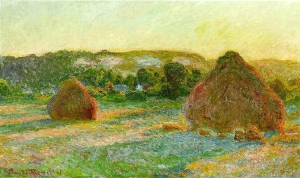
Claude Monet: End of Summer
I suppose I am not the only one who is sad that summer is done; everybody I know is a bit manic about how the time has flown by. For me this happens at every August’s end, and I am sure it is related to piles of regret, legitimate wishes for more time away, time wasted, as well as some deeper melancholy that I can’t quite name. It is clear to me, though, that I long for two somewhat related things, and that these things always come to my awareness this time of year: greater connection to God and greater connection to creation.
This time of year many of us want to squeeze in a bit more outdoor time—one more hike, one more visit to a local park, a bit of yard work, or harvesting produce; we go to the shore or the lake or the garden, and wish for just a bit more time. The beauty of the days makes me think about not only being outdoors, but reading about creation; maybe not going into the wilderness on a canoe, but reading about those that have. I wonder if others are like that.
So, soon enough, I’ll tell you about a remarkable book or two that are sure to thrill those who like the genre of nature writing.
But first, and most urgent, some titles that have helped me—or at least reminded me—of this deep need for a more lively experience of God.
I’ll highlight a handful of new or important ones over at the monthly column, soon, but first, two that I most thoroughly enjoyed, and that we want to commend to you.
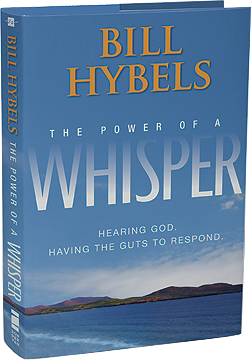 The Whisper of God: Hearing God. Having the Guts to Respond. Bill Hybels (Zondervan) $22.99 I know, I know, some of us read Thomas Merton or work at the deep tradition of centering prayer, and may suppose this chatty collection of stories by a mega-church big shot is a bit light-weight. Or, we understand the need for very solid doctrine and clear explanations of foundational truths, and we fret that the Willow Creek leader may be a bit too CEO-ish for our orthodox tastes, failing at being adequately clear about the whole truth.
The Whisper of God: Hearing God. Having the Guts to Respond. Bill Hybels (Zondervan) $22.99 I know, I know, some of us read Thomas Merton or work at the deep tradition of centering prayer, and may suppose this chatty collection of stories by a mega-church big shot is a bit light-weight. Or, we understand the need for very solid doctrine and clear explanations of foundational truths, and we fret that the Willow Creek leader may be a bit too CEO-ish for our orthodox tastes, failing at being adequately clear about the whole truth.
Well, let me say this: I don’t care where you are on the theological spectrum or what sort of reading habits you have, or what your concerns are about mega-churches, these stories will inspire you, impact you, maybe change your attitude about Willow and Mr. Hybels, and may—just may—remind you that God is alive and well, and wants to be in communication with you. What you think of Willow Creek is less important that what you think of God and God’s activity in your life. Does God whisper to you? Do you dare say so? Are you experienced at hearing? How do you respond?
Some have said that this is Hybels’ best book yet, and he himself says in the preface that some of this stuff he has been waiting for decades to write. He didn’t want to seem flakey or immature or unwise, so he let this idea–that God whispers stuff to us through holy hunches and quiet leadings–percolate for half a life-time until he felt he had something true to say about it all.
I challenge anyone to read this and not be moved. He shares enjoyable and often riveting story after story of those who felt God’s gentle guidance to do things, to say things, to stop saying things, to change course, to pick up a task or calling or career. His own life is replete with these, and it is my sense that he does not overstate the way in which the Spirit guides us. His own raw honesty about this—often set in times of great conflict or pain or loss or stress—is very helpful for any of us that are feeling the end of summer blues, anxieties about up-coming schedules, going through complicated times, or who need to know of God’s presence in the ordinary days of life. It was a very good book for me to read this season and it may be for you.
I was encouraged by a few the stunning stories that shout “holy smokes, can you believe that?” but I am even more encouraged that most of the stories Hybels tells are made of fairly ordinary stuff and show God’s promptings into pretty standard actions. Like being nicer to your wife. Be helpful to that person being insulted in an airport. Give a bit more money to that charity. Let your daughter stay out later than your fatherly instincts permit. Tell a friend that you are concerned about his attitude. Read that book. Take a day off and go have fun.
There are several sections describing various ways God speaks which Hybels outlines (through the Bible, naturally, through friends, internal promptings, etc.) He is helpful about he processes of discernment and is not glib about “hearing” The Voice. (He gives some practical advise, too, on how to discern if it is not God’s whisper; “filters” he uses.) Great storyteller that he is, he shows how this way of listening (and faithful listening, of course, means doing what one is told) played out for him in various sides of life. His section about parenting is truly touching, and his admissions about his struggles at parenting two different sorts of children—and learning to hear God’s guidance about showing grace and trust—was reassuring and helpful. Since I am also reading his daughter Shauna Niequist’s wonderfully written Bittersweet: Thoughts on Change, Grace, and Learning the Hard Way (Zondervan; $16.99, but on sale for $12.97) it is fun hearing about her as a child. Yes, this parenting section was a bit challenging, but also quite helpful.
The extraordinary ending chapters are about hearing “Whispers That Change the World” and revisit themes that are important at Willow Creek—themes of social change, service of the poor, standing for justice, racial reconciliation, global friendships. I challenge any church who has interests in these callings of social concern to read his story of deepening care (and action) and not admire the solid work and prophetic witness of this gang of folks. Some mainline denominational folk, in fact, who pride themselves of their concern for this arena, could learn a bit about social innovation, I’d think. I loved the whole book, but I kept wanting to tell others about this section, in part because so many don’t understand the significant social outreach, anti-poverty work, advocacy for immigrants and ethnic diversity that Willow Creek has engaged in. Yes, it is influenced by Hybel’s experiences in Africa (even as a teen, when he wondered through the slums of Cairo) and other places, but it mostly rooted in his holy engagement with the Bible and the Spirit. Again, The Power of a Whisper shows the way ministry and leadership and daily discipleship–even in ways t
hat lead to controversial social positions—can be influenced by the promptings of the Spirit, informed and shaped and moved along by our attentiveness to God’s voice in our lives. This is great, great stuff, and I hope many read it, and “have the guts to respond.”
Is this rocket science? Is it deep medieval mysticism? Is it complicated or weird or risky? Well, this book does not make it sound that way at all. It did not strike me as breathy or over-stated or dramatic at all. Still, I wonder, sometimes, if those of us who are rather ordinary Christians—Protestant, Catholic, evangelical, Anglican, whatever—live as if God is silent, and the world is more or less “secular” except for the doctrines and dogma we hold and the ethics and worship rituals we practice. This easy-to-read and very inspiring book will show us a better way. With stories and examples and clear-headed conversational teaching, this delightful guide will remind you that God does want to speak to you. And that we can live not only with the idea of God as creator and savior, but as the One who is in relationship with us, and speaks and allows us to experience holy guidance, step by step, whisper by whisper.
Of course, there are other books on this topic, some deeper, some more complex, some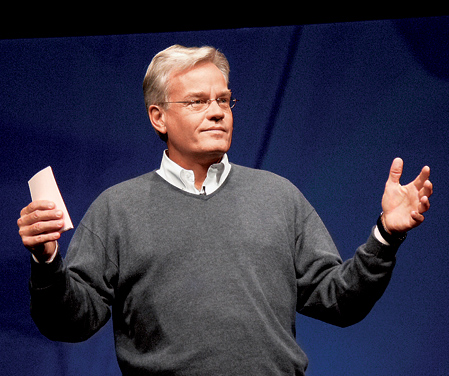 perhaps more theologically mature. I will soon publish a list over at the monthly column, highlighting more. Hybels himself is not new to this inner life stuff—his popular book Too Busy Not To Pray: Slowing Down to Be With God (IVP; $15.00) is excellent and you may know that he had hired Ruth Haley Barton (whose books we often cite here) for a season at Willow to train folks in spiritual direction. The Power of a Whisper, though, is the one that drew me in, reminded me of very basic stuff, helped me recall great truths, and touched me noticeably. It is engaging, interesting, inspiring and very helpful, if you are open. Are you?
perhaps more theologically mature. I will soon publish a list over at the monthly column, highlighting more. Hybels himself is not new to this inner life stuff—his popular book Too Busy Not To Pray: Slowing Down to Be With God (IVP; $15.00) is excellent and you may know that he had hired Ruth Haley Barton (whose books we often cite here) for a season at Willow to train folks in spiritual direction. The Power of a Whisper, though, is the one that drew me in, reminded me of very basic stuff, helped me recall great truths, and touched me noticeably. It is engaging, interesting, inspiring and very helpful, if you are open. Are you?
Here is a short youtube clip about the book. Check it out and them come on back…I’ve got to tell you about another perfect book to read now, as summer moves to fall.
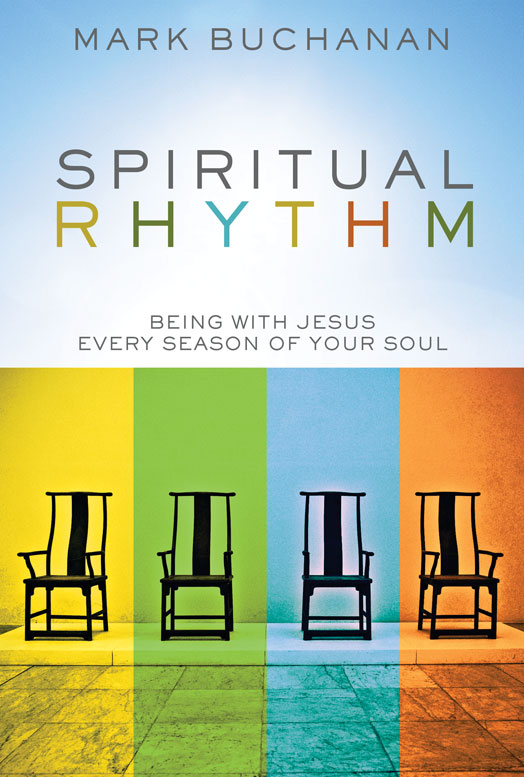 Spiritual Rhythm: Being With Jesus Every Season of Your Soul Mark Buchanan (Zondervan) $17.99 I have raved before about this author, and Beth and I have both suggested that he is the exact sort of author we enjoy telling folks about. Why? Well, there is something good about his style, it is writerly, creative, full of nuance and care and the fruit of the hard work of good craft. And yet, it is in no way cryptic or weird or overly-complex. Some excellent writers are so poetic, you know, that it is tiring to read their allusive prose. Buchanan is a fine wordsmith, a good writer, and makes the reading experience a delight. And yet, he is a preacher at heart, so he is leading us into applicable truths and into our own teachable moments.
Spiritual Rhythm: Being With Jesus Every Season of Your Soul Mark Buchanan (Zondervan) $17.99 I have raved before about this author, and Beth and I have both suggested that he is the exact sort of author we enjoy telling folks about. Why? Well, there is something good about his style, it is writerly, creative, full of nuance and care and the fruit of the hard work of good craft. And yet, it is in no way cryptic or weird or overly-complex. Some excellent writers are so poetic, you know, that it is tiring to read their allusive prose. Buchanan is a fine wordsmith, a good writer, and makes the reading experience a delight. And yet, he is a preacher at heart, so he is leading us into applicable truths and into our own teachable moments.
Buchanan struck me in his earliest books, Your God Is Too Safe and The Holy Wild. But he really got me in his very well designed and nicely written book on the sabbath, The Rest of God: Restoring Your Soul by Restoring Sabbath. Starting with a Christian view of work, he then shifted to a view of rest and from there, to entering the very rest of God. You know that as an author he has done his research–he cites the likes of Abraham Heschel—but yet it isn’t ponderous or needlessly deep. It is one of my favorite books on this matter of sabbath and rest and renewal.
And yet, I remain too often weary and too rarely overjoyed by the “rest of God.” I know I am not alone. I think that Mr. Buchanan understands, and is committed to helping his readers enter that rest, appreciate that Presence, live into the abundance of a sane friendship with Christ, day by day. The book after The Rest of God was about citing God in the ordinary, a beloved theme around here (we have an entire section of the “spirituality of the ordinary” in our contemplative living section.) That book was nicely entitled Hidden in Plain Sight.
But now, here is his new one, and perhaps his best yet. Spiritual Rhythm is not necessarily about the literal seasons, but he uses the time-honored metaphor of “seasons of the soul.” For each season, he shows differing ways we experience God, live into our discipleship, encounter God’s presence, and ways to enhance our spirituality in those unique times.
I like this for–oh, let me count the ways! There are oodles of reasons for appreciating this approach, but one should be obvious: a life of discipleship is always and everywhere rooted in the realities of our life in time. That is, there are ups and downs, seasons and eras, phases and stages. Whether these are times that are shaped by certain emotions—grief, obviously, or the joy of approaching an upcoming wedding or the anxieties of a new job—or a phase in life (being a twenty-something or hitting the upper end of mid-life, say) there simply are social and physical realities that necessarily impact how we live out our faith. I don’t know about other world religions, but Christian faith is always embodied, down-to-Earth, real. So we’ve got these “seasons” both literally and figuratively.
Buchanan shows us how each stage of life, each season, can be an opportunity for experiencing God in some new way. To say that the book invites you to deepen your relationship with God in all times is to miss the edge and insight of this particular book. The author literally helps us attend to our feelings and experiences in these different times of life and helps us see how they can uniquely move us to encounter God in fresh ways. It includes tons of Bible reflection, side-bars which are experiences to ponder, some good guide-lines for nurturing the art of discernment during your particular season of life.
I suppose this is nothing new to those who are well read in the spiritual classics. Jesus Himself said to “abide” in Him, so this move to resist busyness, to arrange our lives for spiritual transformation, this embrace of what Ruth Haley Barton has called Sacred Rhythms, is sage counsel. What I like most besides the pleasant and at times arresting prose, is the way Buchanan helps us “respond to the weather of the heart” (as it says on the dust jacket) “whether we are flourishing and fruitful, stark and dismal, or cool and windy.” In comparing spiritual changes to the seasons of the year, Mark shows us what to expect from each season and how embracing those rhythms allows our spiritual lives to prosper.
We hear a lot about sustainability these days; this is good. We’ve had books on sustainable agriculture and energy use and stewardly economics since the day we opened nearly 30 years ago. But what about sustainable spirituality? And is Buchanan right that a key is seasonality? Can our faith go the distance, through thick and thin, winter’s blast and summer’s heat and the good delights of any season? I’ve admitted my own melancholy these days. I suspect that nearly everyone—if they are alive to the world and pay attention to these terrible days in our culture—ma
y share some anguish at times. And, some joy and goodness. How does God show up in each of these emotional states? How can the various times of our lives be avenues of connecting to the Holy? How can we find greater guidance and grace no matter the season of your soul? Spiritual Rhythm: Being With Jesus Every Season of Your Soul will help. It will be enlightening as you learn new ways to have your faith practices and spirituality in sync with the era of your life, and it will be helpful to press you to experience more of what God’s Kingdom can be as you abide in Christ. He explains what is good, or what the dangers, joys or pitfalls of each season might be.
There is a bountiful harvest of insights here, more content than you can use in a week or so.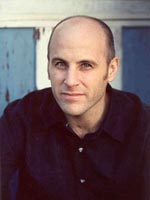 Savor this for a season, maybe for a year. I think if you buy it now, you will not regret it. He reminds us that you “may want to zigzag through it, going first to the season that most intrigues you, because you are in it, or because you wish you were.”
Savor this for a season, maybe for a year. I think if you buy it now, you will not regret it. He reminds us that you “may want to zigzag through it, going first to the season that most intrigues you, because you are in it, or because you wish you were.”
Mark writes, in the introduction, after wryly calling Jesus the “Man for All Seasons”
Eternity hides beneath the guise of each season’s beauty. That beauty is eternity’s slight of hand, the trick it uses to bedazzle and bewilder us, to take our hearts’ longing appear and disappear right before our very eyes. You think you crave the summer of ’69, or whatever summer you were young and in love. But that summer was only a dress rehearsal for what your heart really wants: heaven.
Heaven whispers in the burden God lays on us. The everlasting flits beneath earth’s swiftly fading beauty. God sets eternity in our hearts, and it tells us not to despair of the burden. It warns us not to be overcaptivated by the beauty. For though we want the burden lifted and the beauty prolonged, God has an infinitely better idea: that the Man for All Seasons would walk with us in season and out….
20% off
order here
takes you to the secure order form page
inquire here
if you have questions or need more information
Hearts & Minds 2345 East Main Street Dallastown, PA 17313 717-246-3333

Such a good post, thank you!
I love Buchanan’s books. I bought this one last week and love it. It might be his best one. You are spot on regarding his style. He really does write well. His book on sabbath is quite good, too.